| Newsletter - 2002 Archive |
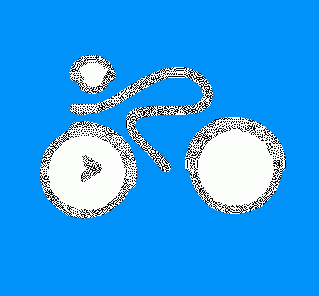
|
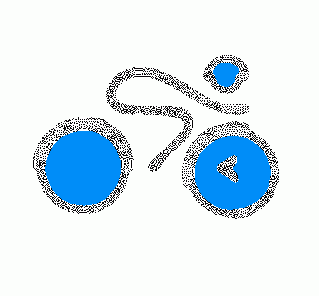
|
Cycling Club |
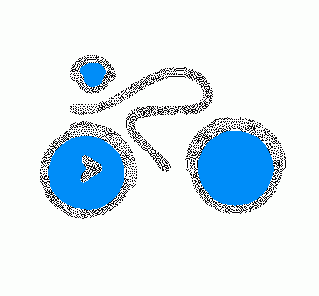
|
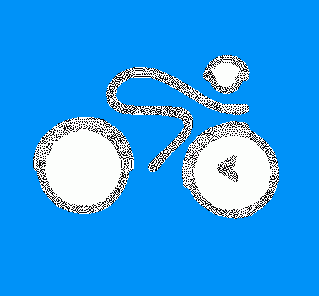
|
| Newsletter - 2002 Archive |

|

|
Cycling Club |

|

|
Next--->
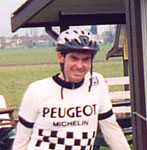
A lone figure in simple Grecian robes stands deep in thought on the steps of the Parthenon - the Temple to Athena. A second figure, the student Fergus Doltus, ascends the Acropolis dressed in a strange stretchy black material, wearing a hard hat with a high intensity light bound to its front, and a curious bag strapped to his back filled with an improbably orange liquid. Fergus Doltus approaches his logic master, the great Socrates...
Fergus Doltus: Master Socrates, have you heard of this remarkable adventure-sporting event called Paris Brest Paris?
Socrates: No Fergus, tell me about it.
Fergus Doltus: Well, it's a bike ride. 3500 participants from many places around the world converge on a Parisian suburb and then ride day and night through the picturesque French countryside out to the city of Brest in western France, and then back to Paris. The ride is 1200 km long and takes great effort and courage.
Socrates: These participants must be in very good shape Fergus. It sounds like a most strenuous activity. I suppose they must start the event well prepared - their bikes must be in perfect condition, they must be well fed and hydrated, and of course well rested.
Fergus Doltus: Well...yes, yes and no Master Socrates. It is true that their bikes are shiny and in perfect condition, and they do begin with full bellies, as well as full water bottles...but the timing of the starts - for there are three start times - means that everyone begins the ride very short on sleep.
Socrates: This is a most curious situation Fergus. Explain more fully.
Fergus Doltus: Two of the three start times, Master, are in the evening just before people would normally be going to bed, and the third is very early the following morning. For this third start, riders do at least get a few hours of sleep before showing up for the check in, in the middle of the night. It's better than no sleep at all though Master Socrates.
Socrates: At first glance, this plan seems puzzling. Perhaps with logic, this is a puzzle we can solve. Tell me, Fergus, why have the organizers chosen to start an endurance sporting event, which depends on the participants being well rested, at three times which guarantee that all the participants will be sleep deprived as the event starts?
Fergus Doltus: Well it occurs to me Master Socrates that the key for the peculiar start times might be in the varying time limits within which the riders of the three start times must compete their endeavor. You see, the 8 p.m. group must finish within 80 hours, the 10 p.m. group must finish within 90 hours, and the 5 a.m. group must finish within 84 hours. So perhaps the different start times are really meant to control the riders' finishing circumstances. Maybe the plan is to have riders finish in the daytime.
Socrates: Ok Fergus, let's test your theory. The start times would result in finishing limits at 4 a.m., 4 p.m., and 5 p.m. respectively. I see here in the 1999 results parchments that indeed the bulk of the 90-hour group finishes close to their time limit. For the other two starts however this is not so - the riders are spread out quite evenly, and many would have finished at night. We can therefore imagine that perhaps one start time could be designed to facilitate a daylight finish for this 90-hour group, where the riders appear to be more synchronous with their time limit, but how, Fergus, do we account for the other two start times?
Fergus Doltus: There is another factor to consider Master Socrates. For the riders at the fast end of the 80-hour group, Paris Brest Paris is a race - though many like to pretend that it is not so - and for these very fast riders the event takes only about 44 hours. This means that these riders too would be finishing in the late afternoon at 4 p.m. after a day of daylight speediness. Additionally, a 4 p.m. finish is spectator friendly - no one has to get out of bed at odd hours, including let's say reporters. And, if the press just happened to be hanging around at this most congenial time, then the winners might just find their way into the evening news, thus improving media exposure for the event.
Socrates: Your reasoning is impressive, Fergus, but we must remember that only a small number of riders are in this racing group. Surely a way could be found to not sacrifice the sleep of the remaining 98 % of the 80-hour group and still achieve a marketable media moment. Consider this also...just think how much more quickly these racers might ride if they didn't start in a sleep deprived state. And of course none of this helps us to understand the 5 am start time.
Fergus Doltus: Well another thought does occur to me Master Socrates - the answer may be in the nature of the participants. This event demands that the participants suffer discomfort, and frequently experience pain. Should not the organizers design start times that increase the difficulty - the pain and discomfort - of the endeavor so that a successful completion might be judged even more meritorious?
Socrates: This is a possibility, Fergus, but then why would the organizers not also insist that the participants be deprived of food for a long period before the start, and could the organizers not also handicap the bikes themselves by adding weights or other impediments? If inhibiting the riders is the organizers' purpose, it seems illogical that these organizers would neglect other similar means of achieving their purpose.
Fergus Doltus: Then perhaps the illogical nature of the activity is the key - the illogical starting times are symbolic of the illogical nature of this type of cycling - for what logical person would wish to put themselves through an event like Paris Brest Paris?
Socrates: This explanation still seems tenuous, Fergus, but is no less implausible than the other possibilities we have explored. It seems we must concede that the choice of starting times at Paris Brest Paris will remain a mystery. Now make haste Fergus or you will be late for your physics class with Professor Archimedes who doth await you in the bath chamber.
Fergus Doltus: But wait Master Socrates, there is one further matter for which I seek your wisdom, and it's a surprise most glorious. You see, I have decided to organize my own ultra-marathon cycling event starting right here in Athens...I'm thinking of calling it Athens - Sarajevo - Sienna - ASS for short.
Socrates: Your initiative does you credit. But tell me, Fergus, have you considered the thorny question of starting times?
Fergus Doltus: Of course Master Socrates...I have decided to have a start late at night, and a second start very very early the next morning so that prospective participants might see that my event is like Paris Brest Paris.
Socrates: So are you telling me, Fergus, that even though you are free to start your ride at any time of the day or night, you have chosen to send your riders off at times designed to maximize their sleep deprivation, thereby repeating the mistake of the Paris Brest Paris start times that we have made such an effort to expose here today?
Fergus Doltus: There's an expression in the province of my origin Master Socrates: "Monkey see, monkey do."
Socrates: You seem to have learned little from our lesson today Fergus.
Fergus Doltus: I am most repentant oh wise one. How might I atone for this failing?
Socrates: How about 10 "hail Platos", and then ten hill repeats... Oh, and Fergus...
Fergus Doltus: Yes Master Socrates...
Socrates: Do them on Woodside.
Fergus Doltus: Thank you Master Socrates.
_